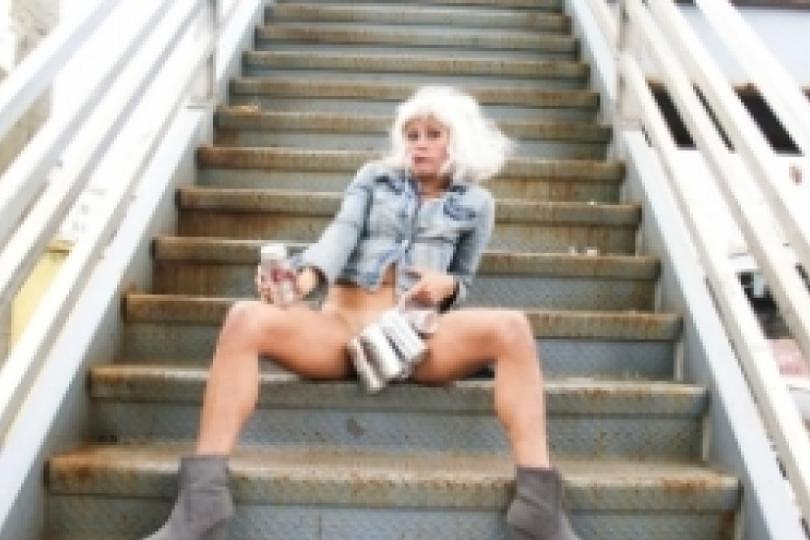Adrienne Truscott's Asking for It is a top-flight bit of stand-up comedy, a smart, polished set that takes chances, coheres beautifully and generates a ton of laughs. As she takes on the comedy community's most controversial topic of the past several years - rape jokes - armed with a smile, a six-pack and a marked lack of pants, Truscott creates something special. I'd call it the most important stand-up set of the moment, except that calling a stand-up set "important" makes it sound like no fun, and Truscott's is more fun than anyone would reasonably expect a rape-themed comedy act to be.
But hey, why am I writing about stand-up in Minnesota Playlist? Well, that's a fair question, and it gets at the main reason Adrienne Truscott's Asking for It will likely ultimately make less of an impact than it ought to. I saw Truscott's show at Bryant-Lake Bowl, a venue with a long history of showcasing comedy. That sometimes includes stand-up - there's a local stand-up showcase coming up this Friday, for instance - but by and large BLB is known as a theater or music space. That seems on par with the history of Asking for It. The show started building buzz on the fringe festival circuit in 2013 and has toured the world to great acclaim in venues ranging from upscale arts centers to comedy festival side stages. It packed the house at BLB two nights running (July 10 and 11) and found an extremely receptive audience when I saw it on Thursday night.
The perils of a receptive audience
But I wonder if that's a bit of a problem. In a lot of ways, this isn't a show that should find a receptive audience. After all, Asking for It wouldn't exist if the issues it addresses weren't so deeply divisive. If you haven't been keeping up on your comedy news, here's a bit of backstory: in recent years a number of male comedians have generated controversy by joking about rape in their routines. Rape jokes are far from a new innovation, but Twitter is, along with its unparalleled capacity for crowdsourcing outrage. People who previously had little agency in this area (read: women) now have the means by which to make their objections heard, and any number of rape-reliant male comics have suffered the social media consequences. This in turn has prompted a volley of passionate defenses from the comedy community, with even revered and less shock-oriented comics like Patton Oswalt and Louis CK defending their colleagues on the grounds of "no topic can be off limits in comedy."
Obviously this is a big, complex issue in the comedy world, and one that's divided fans and comedy nerds the world over. That's why it seems a shame that such a well-crafted piece of rape-focused stand-up is relegated largely to stages that don't necessarily specialize in that particular art form. As an example of what might be missing, one segment of Asking for It revolved around framed photographs of comedians and politicians who have made significant contributions to rape-joke culture, most of whom Truscott proceeded to objectify in hilariously degrading fashion.
When she held up a photo of Daniel Tosh (who she said looks like a prototypical date rapist with "thin lips and a college education"), much of the crowd immediately grumbled its disapproval. That's not surprising, as Tosh, a well-known comic with a hit Comedy Central show, became more or less the poster boy for the rape joke debate when he speculated about the comedic value of a heckler being gang-raped at one of his shows. When Truscott presented a photo of Jim Norton, though, the reaction was noticeably more muted. Norton is a veteran comedian with a special called Please Be Offended to his name and a long history of defending comics' right to make rape jokes. He was a mainstay of The Opie and Anthony Show - another key battlefield in the rape joke conflict - and turns up in quite a few episodes of Louie. Mention Jim Norton in a room of moderately serious comedy fans and everyone will know exactly who you're talking about. A large part of the crowd at BLB on Thursday appeared not to, which put a bit of a damper on Truscott's elaborately detailed description of the "serious circumstances" that would be required for her to ever consider having consensual sex with Jim Norton.
I'm not trying to say that you need an encyclopedic or even more than a casual knowledge of the modern stand-up scene to appreciate Adrienne Truscott's Asking for It. The BLB audience certainly seemed to dig it, even if many folks didn't get all the references (I think I'm reasonably well-versed on the topic, but I'll admit I didn't know a couple of the international rape-jokers Truscott called out). But as great as it is that this show has been embraced by the sort of folks who go see comedy theater and one-woman shows, it's a shame that it will probably never find a home in stand-up clubs where everyone knows Jim Norton's name, or where at least some of the crowd might cheer at the mention of Daniel Tosh. Those are the audiences that really need to see this show (which, incidentally, is more sympathetic to rape-joke defenders than they might presume).
How do you get into the comedy clubs?
I understand that there are plenty of reasons Truscott and her "one-lady rape about comedy" would have a hard time cracking the stand-up circuit. For one, before doing this show Truscott was best known as a performing artist, not a comedian, and there are few professions that place a higher premium on paying your dues than stand-up comedy. I can see that case, but after a year of touring the world, I'd say Truscott and her material have established their bona fides. For another, Truscott performing bottomless and using her groin as a movie screen could be written off by some as a cheap gimmick. But Truscott's nudity is no more a gimmick than Judah Friedlander's hats or Gilbert Gottfried's voice, inasmuch as they all help establish a character (and Truscott's gimmick is far more utilitarian than most).
And maybe most importantly, venues, audiences and comics might be scared off by the assumption that Asking for It is a satirical excoriation of rape-joke culture. And it is, to some extent, but Truscott is far from a scold. Her set is also one of the best pieces of evidence that rape jokes can in fact be funny, especially when they're delivered from somewhere other than a position of white male privilege. If the rallying cry of rape-joke defenders is "Your personal offense doesn't trump my right to joke about anything I want to," then it has to be a two-way street. In an industry that often thrives on controversy, there's no good reason to turn away something this juicy, this well-made or this flat-out funny. It's a show I'd pay to see again, and all due respect to Bryant-Lake Bowl, I hope I'll have the chance to give that ticket price to a genuine comedy club.
Ira Brooker
Ira Brooker is a writer and editor residing in Saint Paul's scenic Midway neighborhood. He holds down a corporate job by day and does freelance and creative work at night. He is a former editor of
Minnesota Playlist and has been published in a number of venues both local and national, several of which you may have even heard of. He occasionally prattles on about pop culture at
A Talent For Idleness and maintains an archive at
irabrooker.com.





